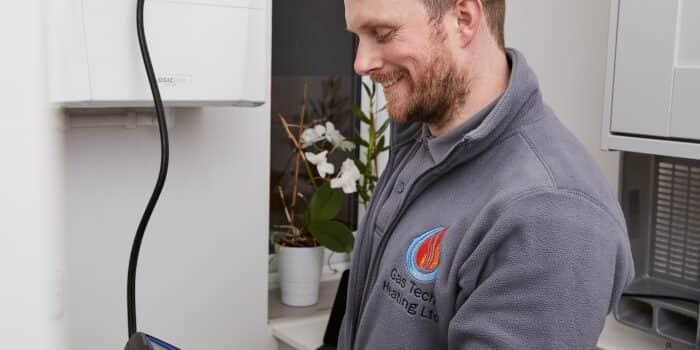If you notice your boiler is not operating efficiently, or you are suffering with no hot water, it is possible that a loss of pressure is responsible for this. You should be able to easily identify whether or not this is the case, and it may be possible to fix this problem yourself, but you should not take any chances when trying to fix your boiler. If you are not confident fixing this, you should contact a Gas Safe registered engineer to do it for you. Allow us to explain some common causes of a loss of pressure, and how you can fix them.
Boiler pressure explained
Your boiler works by heating cold water and circulating it around pipes and radiators in your home, so water pressure is important to transport this water efficiently. If you have a modern combi boiler, a filling loop is connected to your cold-water pipe to maintain pressure.
What causes your boiler to lose pressure?
The two most common ways your boiler loses pressure are:
Leaks
You may have a small leak somewhere in your heating system. Even the smallest leak can lead to pressure dropping, so when trying to find a leaking pipe, you should look for damp patches around your radiators, pipes, or the boiler itself. We would advise you not to look for leaks inside the boiler, as this could be dangerous, so only a qualified engineer should undertake this.
Bleeding the radiators
If you have recently bled your radiators, this can often cause a loss in pressure. This is because during this process, air is released through the radiator valves, lowering the pressure in your boiler system.
Checking your boiler pressure
You should check your boiler for a water pressure gauge, which should be located at the front and will indicate whether there is adequate pressure in your heating system. If the pressure is below 1 bar, this indicates that there is not enough pressure, and you will need to address this problem. The gauge should read just above 1 bar when radiators are off, and just above 2 bars when radiators are on. Anything around 3 bars or above is too much pressure, so you may need to open your pressure relief valve.
Fixing low boiler pressure
Whether or not you can fix the problem yourself will depend on the type of boiler you have, so you should check the manual to see if you can re-pressurise your boiler easily. You should also check the control panel to see if there are any instructions on how to do this. Allow us to explain the basic process:
- Switch off your boiler so that it can cool down.
- Check the filling loop to make sure it is properly attached.
- Open the valves to allow cold water into your heating system.
- The pressure gauge should begin to rise, so allow it to reach 1.5 bars before closing the valves.
- Switch the boiler back on and press the reset button, then disconnect the filling loop to complete the process.
If this fix does not work for your boiler, there may be a problem with the filling loop or the expansion vessel may need repressurising, so you should call a heating engineer to fix this. Our team at Gas Tech Heating will be able to help. Our trained gas safe engineers can fix any problems you may be having with your boiler to get it back up and running. To get booked in with us, 01442 832202 or email info@gastechheatingltd.co.uk and we will visit your property as soon as possible.


